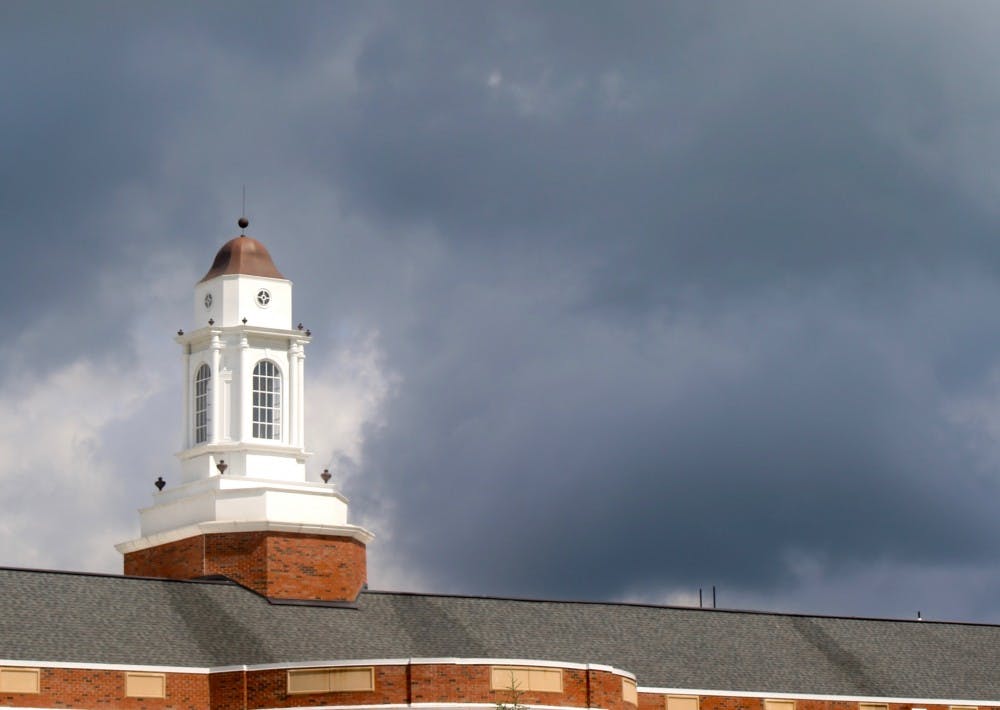For all of the preparation and worry, the anticipation for Hurricane Florence left more of a mark than its landfall did at Elon University.
The once Category 4 hurricane devastated coastal Carolina, causing more than 30 deaths and an estimated $17 billion to $22 billion worth of damages. But the deadly storm took a path mostly staying south of Alamance County before hooking around western North Carolina and heading northeast.
Florence dumped a total of 5 inches of rain onto campus, according to a gauge outside of Truitt Hall on Elon’s South Campus. Three inches of that rain fell between 4 p.m. Sunday and 8 a.m. Monday. The effects of the rain were so muted that the Elon Fire Department didn’t respond to a single storm-related emergency call.
Yet despite being spared the brunt of the storm, Elon’s emergency response plans were put to the test, and in the coming weeks and months, so will the university’s commitment to supporting those hit hardest by the storm.
‘Strongly encouraged’ to leave
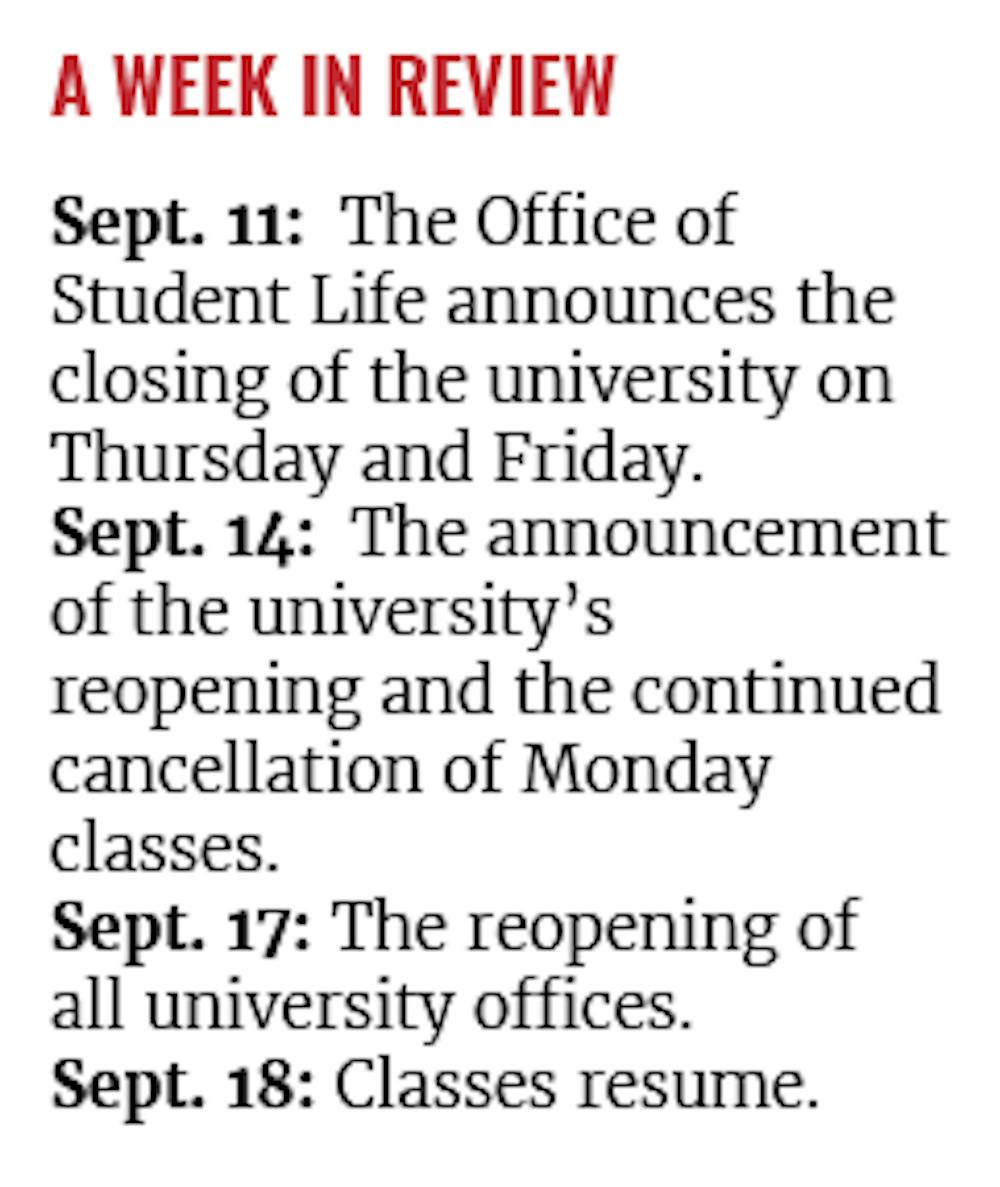
Acting on the information available on Sept. 11, a group of senior administrators canceled Thursday and Friday classes. Later that day in an email to the student body, the Office of Student Life “strongly encouraged” those able to leave campus. By the time Florence reached Elon, there were only an estimated 1,400 students on campus.
In order to house the students who stayed on campus and in preparation for the coming storm, the university activated its Emergency Operations Center for the fourth time in the last decade.
The purpose of this center was to create a command structure that would allow the university to address pressing issues efficiently. The EOC mirrors a framework provided by the Federal Emergency Management Agency.
At the top of that framework is the emergency manager, who for Elon during the week of Florence was Bob Shea, associate vice president for business, finance and technology.

“From my vantage point, it was a win-win. We didn’t have the really negative impact that other folks did in North Carolina, and we got to exercise our emergency action capability in a low-risk environment,” Shea said.
For Elon, an exercise was all Florence ended up being.
According to Shea, because of the university’s prudent planning, the EOC did not have to face any major challenges. The only unplanned event was a broken water heater in Clohan Hall, which resulted in the serving of breakfast and lunch on paper plates.
“That’s really the only negative thing that happened and that wasn’t a hurricane effect, that was just obsolescence of equipment,” Shea said.
Elon’s planning for the coming hurricane began on Monday, Sept. 10. By Wednesday the EOC was coordinating with offices such as Physical Plant, Campus Police, Residence Life and Dining to ensure that staff members were on campus throughout the storm.
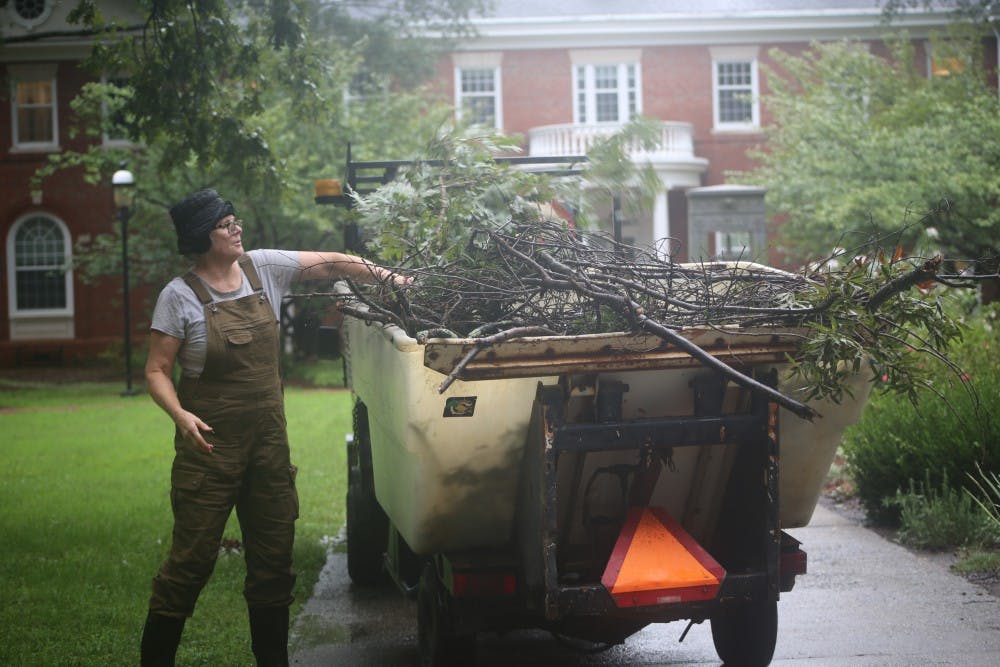
All of the expenses for storm preparations were covered by the university’s contingency operations budget, which according to the office of business, finance & technology is estimated to be $2.5 million, roughly one percent to two percent of the school’s expense budget.
One of the main expenses the university will be covering is the overtime pay for all the individuals who worked throughout the days the campus was closed.
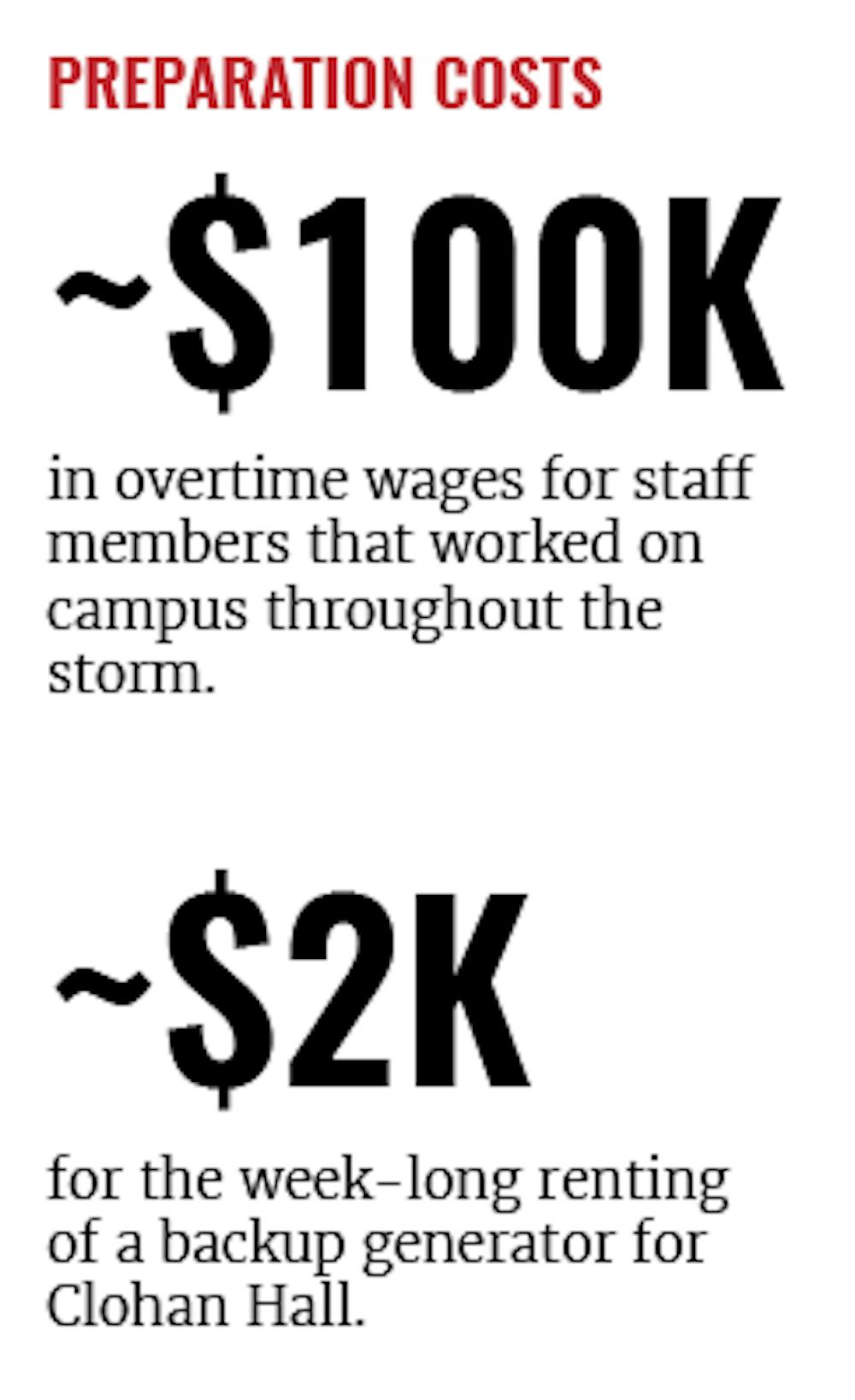
This is estimated to cost the university $100,000. The second main expense was the renting of a back-up generator costing roughly $2,000 a week for Clohan Hall, which was the only dining hall open on campus.
But for Shea, communicating with the community proved to be more difficult than paying these bills.
“It is really hard to understand how people are going to receive your message,” Shea said.
According to Shea, the university has received both positive and negative comments regarding their communication throughout the week.
Chet Deshmukh, parent of freshman Nihar Deshmukh, believes the university did a “fantastic job” communicating with parents and making sure students on campus were cared for.
However, next time the campus is in a similar situation, Chet hopes the university will set up a separate blog post to address parent’s questions.
“It would have been easier if there was a blog where parents could post and communicate with Elon directly,” Chet said. “Not allowing parents to necessarily post and make it a chat, but making it a blog where questions can be asked rather than going to parent-to-parent, which sometimes can cause more fear.”
As a resident of Burlington, Chet tried to do his part in helping the Elon community by going online and posting on “Elon’s Parent to Parent Page.” Chet’s posts on the nearly 2,000-member Facebook page mostly concerned Florence updates on the Elon area, which he hopes calmed the fear of some parents.
Battering academics
Alongside the rest of the campus, professors also had to prepare to alter their syllabuses after the storm canceled three days worth of classes — a decision that was made by administrators at the highest levels of the university.
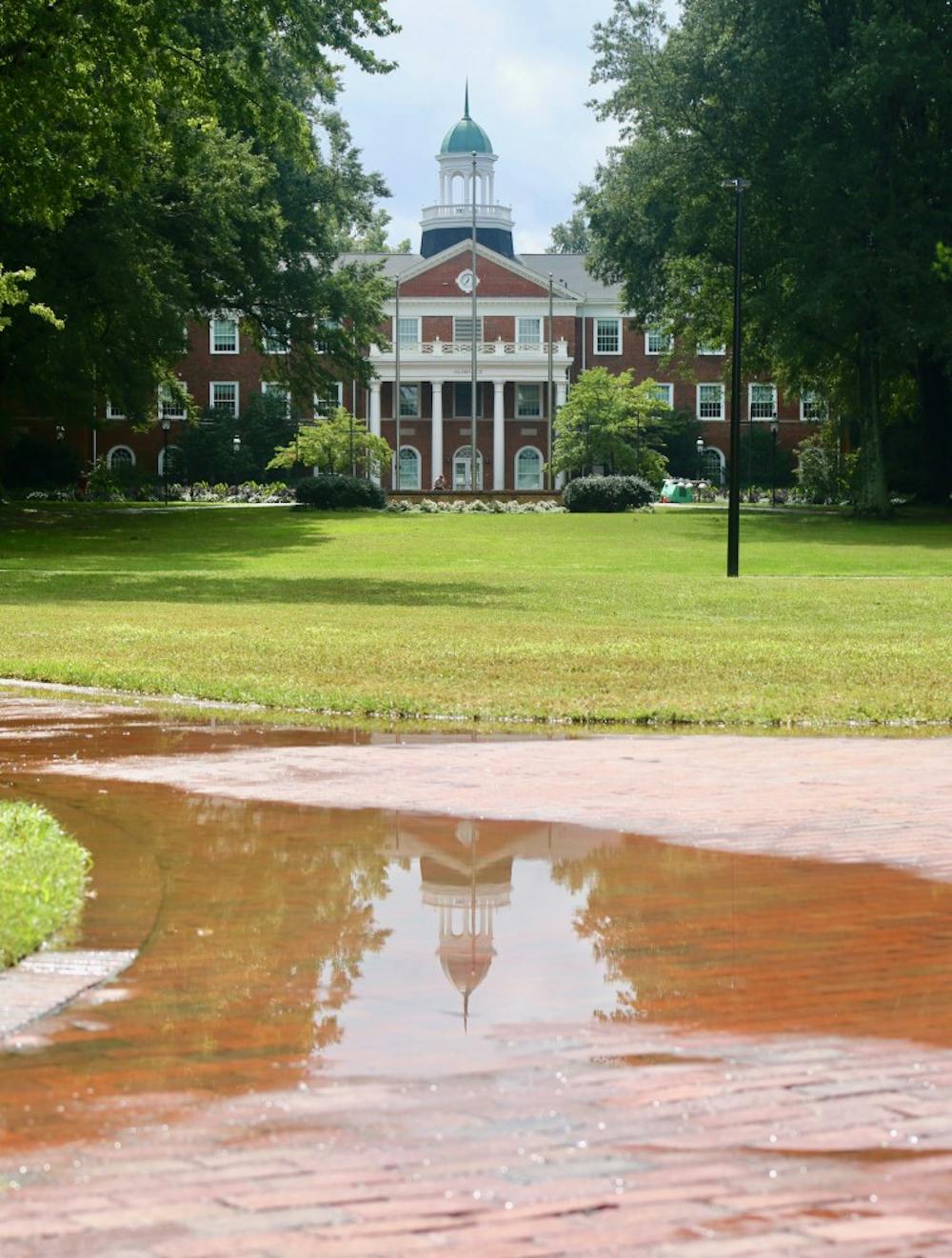
A puddle in Young Commons reflects Alamance Building moments after rain over Elon stops on Monday, Sept. 17.
The cancellation of classes was announced by Jon Dooley, vice president for Student Life. He was one of the administrators involved in making the decision.
“Whenever possible we like to continue the academic progress at the institution. The time students spend in class is incredibly important to this university,” Dooley said. “But we need to make sure we do that in a way that is safe for all of the members of our community. We’re constantly balancing that desire to keep academic progress with the safety of our community.”
While classes may not have been meeting physically, professors were advised by the Steven House, provost and executive vice president, to use the services provided by Teaching and Learning Technologies to continue the “teaching and learning process as best possible.”
“We are trying to make sure we are successful in delivering learning outcomes,” House said. “That may require face-to-face interaction, but there are others ways to do that and each faculty member is responsible for that.”
Members of the TLT worked with the Office of the Provost to make sure that instructors on campus were well aware of the technology that the university provided. On the days campus was closed, staff members at the TLT made sure to be available if faculty members needed assistance. But as whole, they didn’t.
According to Scott Hildebrand, assistant director of Teaching and Learning Technologies, it was a quiet weekend.
“We have been preparing faculty and informing them about all of these resources for a long time and we didn’t see this storm have a huge impact on their ability to use the technology,” Hildebrand said. “Which actually speaks highly about all the faculty and how well versed they are in the utilization of our tools.”
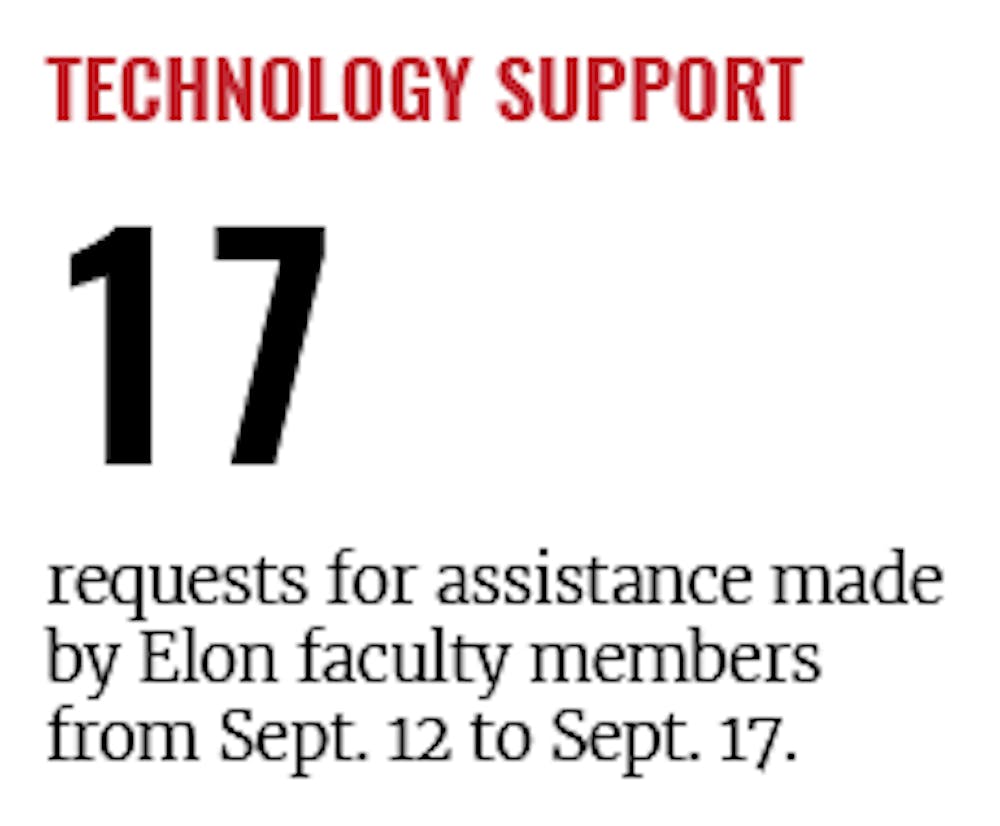
TLT support for faculty is organized through the Technology Service Desk, which received 17 requests for assistance from Sept. 12 to Sept. 17. With 433 full-time faculty at Elon, the service desk saw this as success.
“From all appearances, the instructors and students utilizing our learning technologies were able to successfully continue their work during the break from classes,” said Matt Howell, assistant director of Campus Technology Support.
Associate professor of Religious Studies Geoffrey Claussen is one of the faculty members who took advantage of these tools. The celebration of Rosh Hashana and impact of Florence canceled his Jewish Traditions class for the entirety of last week.
In an effort to continue reaching his academic goals for the class, Claussen recorded a video lecture on Kaltura and had students participate in an online discussion on Moodle.
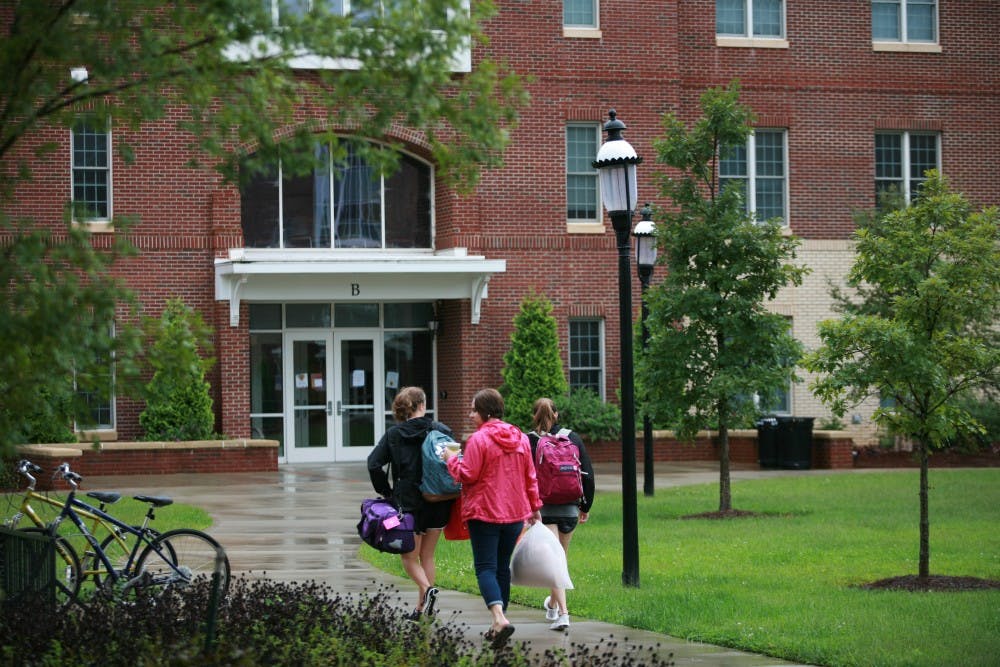
“I’m very careful to ensure that students can participate in the online discussion on their own time and at their own pace, which for some students may be well after they return to campus,” Claussen said.
While currently the Office of the Provost has confirmed there are no plans to reschedule the three days of missed class, that may become a possibility if more classes are canceled due to unexpected weather conditions. House could not confirm how many classes would need to be missed for this course of action to be taken.
Flights to home, the coast and nowhere
For the 118 students with permanent residences in mandatory evacuation zones, it may be weeks before they fully recover. But the majority of Elon’s student body have residence in cities and states unaffected by the storm.
In order to avoid Florence, senior Colton Cadarette flew to his home in Manchester, New Hampshire – a trip he had not expected to make.
While walking into a meeting, Cadarette only had time to read the first section of Dooley’s email on Tuesday, announcing the cancellation of class. It was a few minutes into the meeting when his phone started to buzz.
“My mom read the whole email and said she would rather if I left,” Cadarette said.
The cost for the surprise 800-mile trip to New Hampshire, would have cost Cadarette around $400, but all of that was paid through points. The only expense out of Cadarette’s pocket was the $11 tax that come with rewards travel, a cost he was happy to pay for a week at home.
Originally, Cadarette had booked to return to campus on Sunday, but after receiving the news of canceled classes on Monday, he decided to extend his stay. Southwest Airlines waived that fee because of Florence.
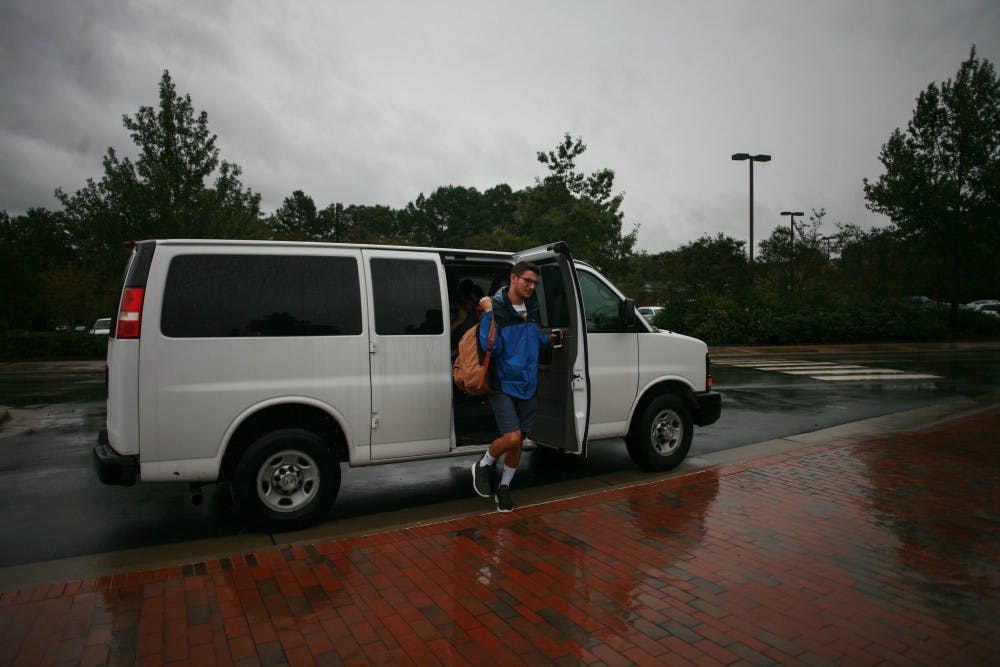
The first Elon student to arrive back on campus, sophomore Chris Luciani, exits on Elon-sponsored airport shuttle on Sunday, Sept. 16. The university organized shuttles for returning students through Tuesday.
Traveling hundreds of miles and rebooking tickets is something international student and sophomore Irisgzel Cheong also had to do during her week off.
This was Cheong’s first hurricane, but Florence’s wasn’t the only storm they were worried about.
As residents of the city of Shenzhen in southeastern China, Cheong’s parents were also focused on preparing for Super Typhoon Mangkhut. This natural disaster was equivalent to a Category 5 hurricane and was a 550-mile wide storm, roughly 140 miles wider than Florence.
“If they were going to be dealing with the typhoon in Southeast Asia, they didn’t want to be freaking out about me at the same time,” Cheong said. “At the end of the day it was expensive, but to them it was a necessity because of my safety.”
Other students were never too concerned that Elon, about 200 miles from the coast, was going to be hit hard by Florence. Sophomore Eric Polite stayed on campus and took the time off to “do all the things your average Elon student doesn’t get to do.”
In his New Trollinger apartment, Polite spent his time sleeping in, watching classic movies, catching up on Netflix shows, listening to new Spotify albums and reading for pleasure.
Taking on Florence
While Florence’s clouds loomed over Elon, local restaurant owners refused to close, adopting the mantra, "If there's power, there's food."

Manager Justin Brawley of MaGerk's Pub & Grill kept the establishment open throughout Florence, providing a refuge with "good food" and "great drinks." Thursday, Sept. 14.
Florence was MaGerks Pub & Grill’s first hurricane on campus. It kept regular hours throughout the storm, providing refuge for those staying at Elon.
“We decided to stay open to give people somewhere to go if they lose power,” said Justin Brawley, MaGerks manager. “We’ve got plenty of space, good food, great drinks, somewhere to come.”
They weren’t alone: Pandora’s Pies, The Root Trackside, Tangent Eat+Bar, Skid’s Restaurant of Elon and Subway also kept their doors open.
While these restaurants anticipated less patronship, the EFD certainly did not.
Fire Chief Alva Sizemore took the forecasts to heart and was preparing his crew to be busy all weekend, but the EFD received zero calls regarding Florence related
incidents.
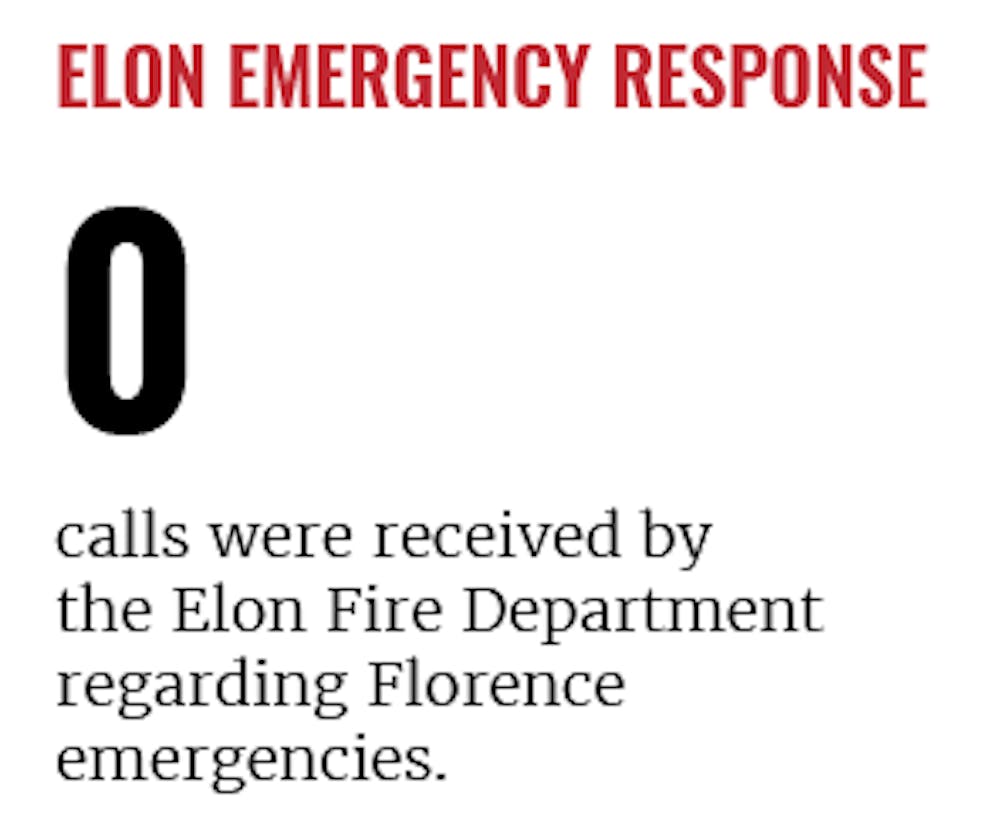
“I was not expecting a quiet weekend at all. I was expecting to be hammered,” Sizemore said. “I thought we would need to have everyone ready to go, but that wasn’t
the case.”
The EFD might not have been directly involved with the taking care of citizens during Florence, but that may change soon. Sizemore expects to be have to send firefighters to help the other departments in eastern Carolina.
“This is going to be an ongoing event and we will do whatever we can to assist people in need,” Sizemore said.
This is just one way Elon is aiding those more affected by Florence.
Helping hands
Even though her home in Villanova, Pennsylvania, wasn’t affected by Florence at all, sophomore Emily Klevan saw her days off from class as a chance to do more than just homework.
As a campus manager for Fresh Prints, Klevan created a new T-shirt design that would be used as a fundraising tool for the victims of Florence.

Courtesy of Emily Klevan
The T-shirt print Klevan and the design team of Fresh Prints created for Hurricane Florence relief sales. It features illustrations of famous landmarks in both North Carolina and South Carolina. All proceeds from T-shirt sales will be donated to the Foundation For The Carolinas.
“I want people to see it and want to help,” Klevan said. “I wanted a shirt that would make people happy, make people from the Carolinas proud and make people not from the Carolinas see how great the two states really are.”
Klevan’s goal is to raise at least $1,000 for the Foundation For The Carolinas, a local nonprofit aiding post-Florence rebuilding efforts. She hopes Elon’s aid to those affected by the hurricane goes far beyond her T-shirts.
“I know we had a Spring Break service trip last year that helped the victims of Hurricane Harvey in Houston, and I really hope we have another to help with this disaster,” Klevan said.
Staff members in the Kernodle Center for Service Learning and Community Engagement have already met to discuss outreach opportunities for those affected by Florence.
“We are checking with our local community partners and then we will be checking with campus colleagues in the eastern part of the state to see when they will be able to receive volunteers,” said Mary Morrison, director of the Kernodle Center. “We want to make sure our community is helping and we will keep the university informed about opportunities that arise.”


